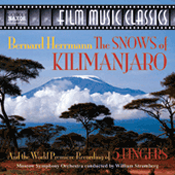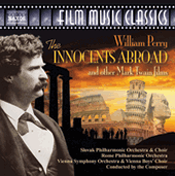
14 Sep 2008
Film Music Classics on Naxos: Herrmann and Perry
There may be no name more famous in the world of film music than that of Bernard Herrmann. William Perry, however, is a name unlikely to set off many bells.
The Sixteen continues its exploration of Henry Purcell’s Welcome Songs for Charles II. As with Robert King’s pioneering Purcell series begun over thirty years ago for Hyperion, Harry Christophers is recording two Welcome Songs per disc.
In February this year, Albanian soprano Ermonela Jaho made a highly lauded debut recital at Wigmore Hall - a concert which both celebrated Opera Rara’s 50th anniversary and honoured the career of the Italian soprano Rosina Storchio (1872-1945), the star of verismo who created the title roles in Leoncavallo’s La bohème and Zazà, Mascagni’s Lodoletta and Puccini’s Madama Butterfly.
Collapsology. Or, perhaps we should use the French word ‘Collapsologie’ because this is a transdisciplinary idea pretty much advocated by a series of French theorists - and apparently, mostly French theorists. It in essence focuses on the imminent collapse of modern society and all its layers - a series of escalating crises on a global scale: environmental, economic, geopolitical, governmental; the list is extensive.
Amongst an avalanche of new Mahler recordings appearing at the moment (Das Lied von der Erde seems to be the most favoured, with three) this 1991 Mahler Second from the 2nd Kassel MahlerFest is one of the more interesting releases.
If there is one myth, it seems believed by some people today, that probably needs shattering it is that post-war recordings or performances of Wagner operas were always of exceptional quality. This 1949 Hamburg Tristan und Isolde is one of those recordings - though quite who is to blame for its many problems takes quite some unearthing.
The voices of six women composers are celebrated by baritone Jeremy Huw Williams and soprano Yunah Lee on this characteristically ambitious and valuable release by Lontano Records Ltd (Lorelt).
As Paul Spicer, conductor of the Royal Birmingham Conservatoire Chamber Choir, observes, the worship of the Blessed Virgin Mary is as ‘old as Christianity itself’, and programmes devoted to settings of texts which venerate the Virgin Mary are commonplace.
Ethel Smyth’s last large-scale work, written in 1930 by the then 72-year-old composer who was increasingly afflicted and depressed by her worsening deafness, was The Prison – a ‘symphony’ for soprano and bass-baritone soloists, chorus and orchestra.
‘Hamilton Harty is Irish to the core, but he is not a musical nationalist.’
‘After silence, that which comes closest to expressing the inexpressible is music.’ Aldous Huxley’s words have inspired VOCES8’s new disc, After Silence, a ‘double album in four chapters’ which marks the ensemble’s 15th anniversary.
A song-cycle is a narrative, a journey, not necessarily literal or linear, but one which carries performer and listener through time and across an emotional terrain. Through complement and contrast, poetry and music crystallise diverse sentiments and somehow cohere variability into an aesthetic unity.
One of the nicest things about being lucky enough to enjoy opera, music and theatre, week in week out, in London’s fringe theatres, music conservatoires, and international concert halls and opera houses, is the opportunity to encounter striking performances by young talented musicians and then watch with pleasure as they fulfil those sparks of promise.
“It’s forbidden, and where’s the art in that?”
Dublin-born John F. Larchet (1884-1967) might well be described as the father of post-Independence Irish music, given the immense influenced that he had upon Irish musical life during the first half of the 20th century - as a composer, musician, administrator and teacher.
The English Civil War is raging. The daughter of a Puritan aristocrat has fallen in love with the son of a Royalist supporter of the House of Stuart. Will love triumph over political expediency and religious dogma?
Beethoven Symphony no 9 (the Choral Symphony) in D minor, Op. 125, and the Choral Fantasy in C minor, Op. 80 with soloist Kristian Bezuidenhout, Pablo Heras-Casado conducting the Freiburger Barockorchester, new from Harmonia Mundi.
A Louise Brooks look-a-like, in bobbed black wig and floor-sweeping leather trench-coat, cheeks purple-rouged and eyes shadowed in black, Barbara Hannigan issues taut gestures which elicit fire-cracker punch from the Mahler Chamber Orchestra.
‘Signor Piatti in a fantasia on themes from Beatrice di Tenda had also his triumph. Difficulties, declared to be insuperable, were vanquished by him with consummate skill and precision. He certainly is amazing, his tone magnificent, and his style excellent. His resources appear to be inexhaustible; and altogether for variety, it is the greatest specimen of violoncello playing that has been heard in this country.’
Baritone Roderick Williams seems to have been a pretty constant ‘companion’, on my laptop screen and through my stereo speakers, during the past few ‘lock-down’ months.
Melodramas can be a difficult genre for composers. Before Richard Strauss’s Enoch Arden the concept of the melodrama was its compact size – Weber’s Wolf’s Glen scene in Der Freischütz, Georg Benda’s Ariadne auf Naxos and Medea or even Leonore’s grave scene in Beethoven’s Fidelio.

There may be no name more famous in the world of film music than that of Bernard Herrmann. William Perry, however, is a name unlikely to set off many bells.
These two discs from the excellent Naxos series dedicated to great film scores offer convincing evidence for this disparity in fame. Although not as individual as his work for Alfred Hitchcock, Herrmann's music for "The Snows of Kilimanjaro" and "Five Fingers" reflects both his professionalism and his talent for evoking a dark-tinged romanticism (perhaps best displayed in the score for "Vertigo"). On a very distant other hand, Perry's work for some PBS-produced adaptations of classic Mark Twain texts conforms to outdated forms, with minimal harmonic interest and predictable scoring (especially the expected banjo obbligato).
The gushing strings and muscular horns of Herrmann's music for "The Snows of Kilimanjaro" adheres to the conventions of a big studio Techincolor adventure/romance. The edgier quality Herrmann brought to his classic Hitchcock scores may be missed by some; they'll find some of the quality in the excerpts from "Five Fingers" (an overlooked gem of a film as well). All the music is well-served by William Stromberg and the Moscow Symphony Orchestra, who have done such admirable work in most of the CDs from this Naxos "Film Music Classics" series.
 Composer William Perry himself leads the orchestras in the disc of his music from films adapted from Mark Twain's writings. Yes, orchestras, as the Slovak Philharmonic, Rome Philharmonic, and the Vienna Symphony Orchestra all found themselves with the not exactly taxing task of performing Perry's music. Think of a hunk of Copland-esque music, with all harmonic interest and rhythmic vitality stripped away. However, in the disc's final selections, from "The Mysterious Stranger," Perry finally produces some passages with more tension and darker colors. That fifteen minutes or so, however, may not compensate for the drabness of the rest of the material.
Composer William Perry himself leads the orchestras in the disc of his music from films adapted from Mark Twain's writings. Yes, orchestras, as the Slovak Philharmonic, Rome Philharmonic, and the Vienna Symphony Orchestra all found themselves with the not exactly taxing task of performing Perry's music. Think of a hunk of Copland-esque music, with all harmonic interest and rhythmic vitality stripped away. However, in the disc's final selections, from "The Mysterious Stranger," Perry finally produces some passages with more tension and darker colors. That fifteen minutes or so, however, may not compensate for the drabness of the rest of the material.
The disappointment of the Perry disc aside, the Naxos "Film Music Classics" series has mostly presented treasures, and this disc devoted to Herrmann's music is one such.
Chris Mullins